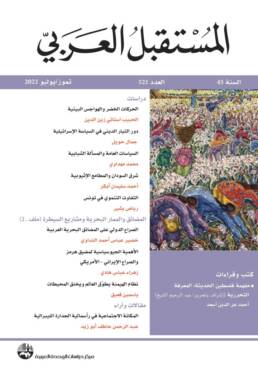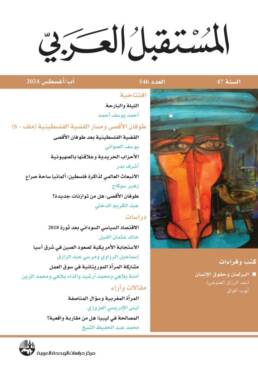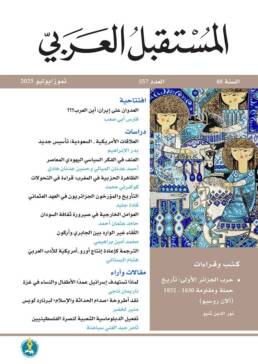The Al-Aqsa Flood and the Path of
the Palestinian Cause (File – 8)
Democracy in the Arab World in Light of the Al-Aqsa
Flood Ismail Al-Shatti 7
Will the Al-Aqsa Flood affect the course of democracy in the Arab world? Has the prevailing authoritarianism in Arab countries ceased to be a necessity for the official Arab regime and the international powers that control it, especially in light of the projects being devised in the region following the genocidal war in Gaza? This study discusses and provides a critical analysis of the state of democracy in the Arab world in light of various criteria and indicators used by several Western democracy measurement centers and institutions. It examines the future of democracy in the Arab world following the genocidal war in Gaza, emphasizing that its impact will not be sudden, automatic, or immediate in the progress of democracy in the Arab world.
Keywords: Al-Aqsa Flood, Democracy, Arab world, West.
Shards of the Al-Aqsa Flood: Theoretical Assumptions and International
Issues at Stake Youssef Antar 28
The “Al-Aqsa Flood” operation and the strategic regional and international transformations it has produced have put many assumptions and theories regarding the understanding of international relations and interactions to the test. These include assumptions that have been associated with Israel since its inception, such as military and intelligence superiority and American-Israeli security coordination. It also challenges the realist theory, which struggles to explain the asymmetrical war unfolding in Gaza through concepts of power balance and deterrence. Additionally, it relates to the axis of resistance and the concept of unified arenas. This operation has also brought several regional issues to the forefront, taking on various dimensions and turns, the most significant being the role of the Arab regional system, the Iranian role, the involvement of governmental and non-governmental international organizations, and the role of great powers, particularly Russia and China, in the conflict.
Keywords: Al-Aqsa Flood, Assumptions and Theories, Israeli Military and Intelligence Superiority, Asymmetrical Warfare, Resistance, Arab Regional System, Iranian Role, International Organizations, Great Powers.
Expressions of Citizenship and Identity in Tunisian Society’s Interaction
with the Al-Aqsa Flood Samia Mohamed Al-Mokhtar Bouabid 48
The war on Gaza provided an opportunity to test the manifestations of Arab citizenship in the streets of the Arab world, particularly through Tunisian society. This study explores the various demonstrations and popular interactions that surged in the Tunisian streets in support of the Al-Aqsa Flood, investigating the expressions and different aspects of Arab citizenship. It concludes that Arab solidarity with Palestine is not merely a humanitarian response to a people facing genocide, but a deep-seated connection to a cause that unites identity and destiny, despite attempts to obscure this sentiment. This bond emerges whenever there is a perceived threat to the nation, awakening the “Arab collective conscience” within every Arab, prompting them to fulfill their duty with respect to Arab citizenship, which begins with selflessness and resistance in all forms.
Keywords: Al-Aqsa Flood, Citizenship, Identity, Resistance.
Studies
Imagined Modernity and the wagers of Power: The Intellectual as a
Postcolonial Phenomenon, and the Practicing Thinker as a Liberatory
Possibility Hisham Al-Bustani 61
This paper offers an alternative reading of the intellectual as a phenomenon that emerged in the context of fascination with colonial achievements, alongside a tendency to catch up with and be independent from it, all while being accompanied by a phenomenon based on the “worship of modernity,” which not only failed to critique it but also considered everything local as inherently backward. Since the intellectual regards their society as regressive and unworthy of being relied upon as a lever for advancement, but rather as the subject of change, they have no choice but to turn to power to present their modernist vision, ultimately becoming a part of the tools for its perpetuation and the reproduction of its domination and functionality. Based on the philosophy of “activation” and the attachment of theory to practice, this paper seeks to establish a conceptual framework for the “practicing thinker,” who is engaged with their community in producing change.
Keywords: Intellectual, Modernity, Power, Practicing Thinker, Colonialism, Postcolonialism
Soft Power as a Determinant of Foreign Policy in the International System:
A Theoretical Foundation Rasha El-Sayed Ashry 80
The forms and manifestations of power have varied from one era to another. Military power dominated in the agricultural society era, while economic power began to grow, becoming the most prominent form of power during the transition to industrial society. With the information age, soft power -represented by culture, values, and ideology – has become one of the most important elements of power in international relations, alongside military and economic power. This study examines theoretical trends in interpreting soft power in international relations and its impact on the international system, where interpretations have varied among realism, liberalism, critical theories, and other perspectives that provide multiple explanations of soft power, despite differences in how the concept is approached from one perspective to another.
Keywords: Soft Power, Foreign Policy, International System.
Women and Sexual Assaults in the Lebanese Wars: Observations from
the Sabra and Shatila Massacre Malek Abi Saab 97
The modern history of Mount Lebanon has witnessed several civil conflicts during which many lives were lost, and women and children were often not targeted. However, this reality began to change during the context of the major civil war from 1975 to 1990. This article will address the transformations in the political landscape of the civil war, particularly the political function of massacres, including the rape of women. The study illustrates how the Sabra and Shatila massacre (September 1982) had multiple uses and outcomes, whether through the rape of women and children or mass killings of civilians, either as acts of revenge or as an intense representation of racist ideology of Lebanese Forces, all under the pretext of protecting Lebanon by “purifying” Lebanese society of “foreign elements” and restoring racial superiority.
Keywords: Lebanon, Civil Wars, Sabra and Shatila Massacres, Rape of Women, Fascism, Racism.
Military Officers and Political Decision-Making in the United States in
the Post-Cold War Era Mohammed Al-Aufi 114
This study addresses the relationship between the military and political elites in the United States, through the lens of theoretical concepts that have approached it in the post-Cold War environment. This era was marked by external pressures that pushed for greater subordination of military personnel to political authority, following the collapse of the Soviet Union, which had previously necessitated an expansion of military independence. However, soon after, counterproductive results emerged, manifesting in severe crises between the two elites as signs appeared of military personnel’s reluctance to comply with political directives and positions. The study concludes that the expansion of political interventions in American military policy was dictated by the new position the United States occupied in the new international system.
Keywords: Military, Political Elite, Political Authority, Developing Countries, Arab States.
Articles and Opinions
The Moroccan Educational System and the Human Rights System in
Towards a Sociological Perspective Mohammed Al-Dhahani 131
By What Method Do We Understand the Discourse of New Communication
Technologies? Ali Ghuwaidi 140
Books and Reviews
The Big Delusion: The Rise and Fall of American Ambition in
the Middle East (Stephen Simon) Thanaa Fouad Abdullah 154
⬛ Books Summaries 160
Arabic Books: The Souls of the Flood: Exceptional Models of Heroism and Resilience in the Al-Aqsa Flood; Depleted Uranium: Nuclear Horror in the Gulf Wars; Criminal Contribution in Arab Legislations; The Secret History of Freemasonry: Secret Masonic Documents.
Foreign Books: The Inequality of Wealth: Why it Matters and How to Fix it; The Theory of Collective Reconciliation: A Trinity of Recognition, Responsibility and Reparation; Struggle for Alliance: Russia and Iran in the Era of War in Ukraine; Russia and the GCC: The Case of Tatarstan’s Paradiplomacy.
Research Reports: “Netanyahu is Playing into Khamenei’s Hands”, and “Attacks on Hezbollah Pagers Will Not Improve Israel’s Situation on its Border with Lebanon”.
Conferences
Press Release on the Outcomes of the Thirty-Third Session of
the Arab National Conference – Session: “Al-Aqsa Flood”
Beirut, 31 May – 2 June 2024 170
Add a review
You must be logged in to post a review.








